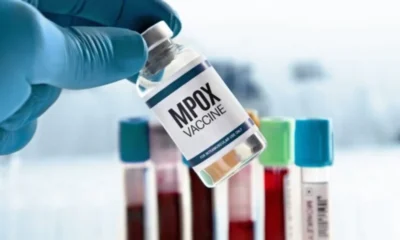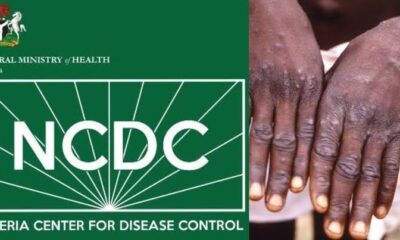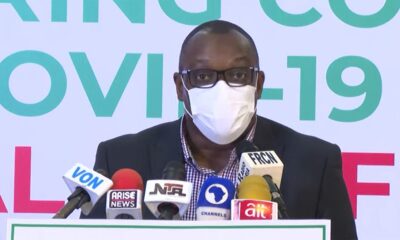NEWS
55 Mpox cases confirmed across Nigeria — NCDC

The Nigeria Centre for Disease Control and Prevention (NCDC) has confirmed 55 cases of monkeypox (Mpox) in Nigeria, highlighting the continued spread of the viral disease across the country.
This confirmation comes from 935 suspected cases reported across 39 local government areas in 21 states and the Federal Capital Territory (FCT).
The NCDC shared this update on its official website, assuring the public that, so far, no deaths have been recorded from the disease in 2024. The data revealed that 70% of the confirmed cases were male, while 30% were female.
The age distribution of these cases showed a significant impact on younger individuals, with 19 cases recorded in children aged 0-10, eight in the 11-20 age group, and 12 in those aged 21-30.
The remaining cases were distributed among older age groups: eight in ages 31-40, seven in ages 41-50, and one case in an individual over 50 years old.
The NCDC also provided a detailed breakdown of the confirmed 55 Mpox cases by state:
Enugu: 8 cases
Bayelsa: 6 cases
Akwa Ibom: 6 cases
Cross River: 5 cases
Delta: 3 cases
Benue: 3 cases
Plateau: 3 cases
Osun: 2 cases
Imo: 2 cases
FCT: 2 cases
Anambra: 2 cases
Rivers: 2 cases
Abia: 2 cases
Lagos: 1 case
Kebbi: 1 case
Nasarawa: 1 case
Edo: 1 case
Ebonyi: 1 case
Zamfara: 1 case
Oyo: 1 case
Kaduna: 1 case
Niger: 1 case
Since the Mpox outbreak began in September 2017, Nigeria has reported a total of 4,752 suspected cases from 36 states and the FCT, with 1,141 confirmed cases (24.0%) and 17 deaths. The NCDC noted that males make up approximately 70% of those affected.
In response to the ongoing outbreak, the National Mpox multi-sectoral and multi-partner Emergency Operation Centre continues to coordinate the efforts to curb the spread of the disease across Nigeria.
Mpox is a viral disease that typically causes symptoms such as fever, rash, and swollen lymph nodes. The World Health Organization (WHO) declared Mpox a global public health emergency in August 2024, and the Africa Centre for Disease Control and Prevention followed by declaring it a public health emergency of continental security.
While the Democratic Republic of Congo (DRC) remains the epicentre of the Mpox outbreak, at least 13 African countries have reported cases, with Guinea recently confirming its first case. The virus has also spread to countries outside Africa, including Pakistan, the Philippines, Sweden, and Thailand.
To combat the spread of Mpox, the WHO has authorized Gavi, the Vaccine Alliance, and UNICEF to begin procuring vaccines, even though the Emergency Use Listing (EUL) decision is still pending. These efforts reflect the global concern over the outbreak and the urgent need for preventive measures.

























